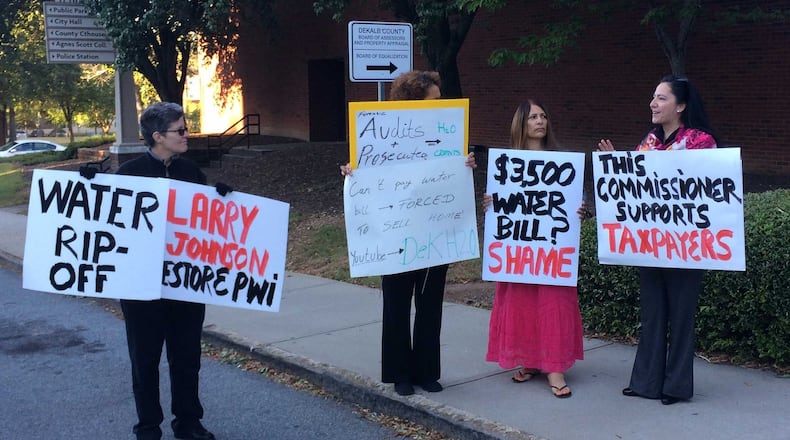So-called "smart" water meters are malfunctioning across DeKalb County, leading to the high utility bills that prompted a heated town hall meeting last week and an emotional protest Tuesday.
The problem? These water meters can break when rainwater or other moisture gets in.
The DeKalb Commission voted 5-0 on Tuesday to suspend installation of the meters, made by Sensus, as the county reviews whether to fix the meters it has or contract with a different manufacturer. The commission also granted the county's finance director greater flexibility to reduce inexplicably high water bills.
Before Tuesday's meeting, several residents demanded a resolution, holding signs saying "Water rip-off" and "$3,500 water bill? Shame."
“It’s their fault and their incompetence,” said Anita Connor, whose water bill for her condo jumped by about $100 per month. “This is taking food out of people’s mouths, literally. This is sending people to the food bank.”
The county is in the middle of replacing 190,000 old water meters at a cost of roughly $30 million. The new water meters are supposed to more accurately measure water usage and wirelessly transmit data hourly.
But smart meters manufactured before July 2014 can malfunction when water touches sensitive equipment, resulting in erratic readings. Of 70,000 smart meters installed, about 43,000 of them were made before July 2014, and 2,200 have already been replaced.
“Whether it’s a reading high or low, what we know is that it’s not reading accurately,” said Interim DeKalb CEO Lee May. “I’m frustrated without end at this. I’m ticked off at our leadership in both water billing and watershed. I’m frustrated with the equipment we’re using, and I’ve been really challenged with our customer service as well.”
Wet meters aren't the only reason bills are skyrocketing.
The meters may not be connected, calibrated or read correctly, said DeKalb Commissioner Nancy Jester. Further, the computerized water billing system itself can introduce mistakes.
“We have to get all our problems solved before we install new meters,” Jester said. “There are human errors, and errors where the meters themselves might be the problem. I’ve even seen meters running backward.”
Commissioner Larry Johnson, who introduced the measure suspending installation of new meters, said residents lack faith that their bills are correct.
“They don’t have a high level of confidence in the accuracy of the new meters. I share their concerns,” he said.
When meters malfunction, the county and the public aren’t being charged to replace them, May said.
The county government has created a team to work with upset customers who are fighting their bills, and May declared a moratorium on water disconnections for nonpayment of bills while residents are in the dispute process.
In addition, the county is starting an outside review process for residents who, after trying to work through their issues with the county, still believe their water charges aren’t accurate. The details of that system may be announced as soon as next week.
Hope Lusignan, who held a sign saying “Lee May pay my water bill,” said her bill was about $40 monthly for two people in her house, but then in rose to $194.
“This seems like extortion,” she said. “There are people receiving bills of $1,000, $1,500 or $3,500.”
About the Author
Keep Reading
The Latest
Featured




